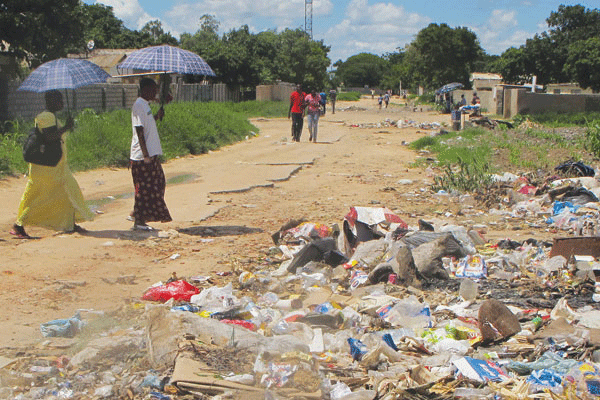
The rainy season is almost upon us. It is therefore imperative for all stakeholders to up their efforts in waste management.
If waste is not managed properly during the rainy season, it may result in devastating effects which include water pollution, which subsequently leads to water-borne diseases such as cholera, typhoid and dysentery. Furthermore, mismanagement of municipal waste can result in the blockage of storm drains which in turn cause flash floods, especially in urban areas.
Why more caution during the rainy season?
During this time of the year, the market will be flooded with various types of foodstuffs such as mazhanje, cooked or roasted green mealies and mangoes, among others. These foodstuffs have a great potential of littering the environment if not handled with care by the users. Therefore, extra effort needs to be taken to ensure that the environment remains clean, despite the changes in the market.
Besides this, the rainy season coincides with the festive season, during which extra waste is generated as a result of the procurements that are related to the festive season. Generally, people spend more during this season and this results in increased waste generation. It then requires individuals to be responsible with the waste they generate, shun throwing litter on the ground and out of vehicles but rather place it in the bin.
Impacts of poor solid waste management
Poor solid waste management results in water pollution which subsequently causes diarrheal diseases such as cholera, typhoid and dysentery. It has now become a trend that in Harare, there is a typhoid outbreak during every rainy season. Recently, there has been reports of a typhoid outbreak in Mbare, which has been attributed to poor waste management, among other causes.
Moreover, poor waste management blocks storm drains. Storm drains are designed to channel excess rain and groundwater from impervious surfaces such as paved streets, car parks, parking lots, footpaths, sidewalks, and roofs. If waste is not properly managed, it will be washed away into these drains and block it such that it will not perform its function to the maximum. As a result, when rain falls, there will be flash floods as a result of poor drainage.
- Chamisa under fire over US$120K donation
- Mavhunga puts DeMbare into Chibuku quarterfinals
- Pension funds bet on Cabora Bassa oilfields
- Councils defy govt fire tender directive
Keep Reading
What should communities do?
lPlace all litter in a bin.
lDo not throw litter out of vehicles but rather have a trash bag into which you can place all your waste awaiting safe disposal in a bin.
NB: For public transport operators, this is a statutory requirement in terms of Statutory Instrument 6 of 2007 which governs the disposal of effluent and solid waste.
lAvoid dumping waste at street corners, open spaces and sanitary lanes.
lSeparate waste at source. Compost the biodegradable waste and use the product in your vegetable gardens, flower beds or for sell.
Link with recyclers on the recycling directory on our website for collection of recyclables such as plastic, paper, metals and bottles. The residue is the one which should be collected by local authorities for disposal at the landfills.
lParticipate in anti-litter activities such as clean up campaigns, in your areas.
Play your part to maintain a clean, safe and healthy environment during this coming rainy season.
lEnvironmental facts, tips and updates are published weekly by the Environmental Management Agency. Send your feedback to: [email protected], like us on Facebook: Environmental Management Agency and Twitter:@EMAeep or visit our website www.ema.co.zw. Alternatively, call us on: Tel 086 77006244 and Toll-free 08080028; or use our WhatsApp platform 0779565707. We are ready to listen.











